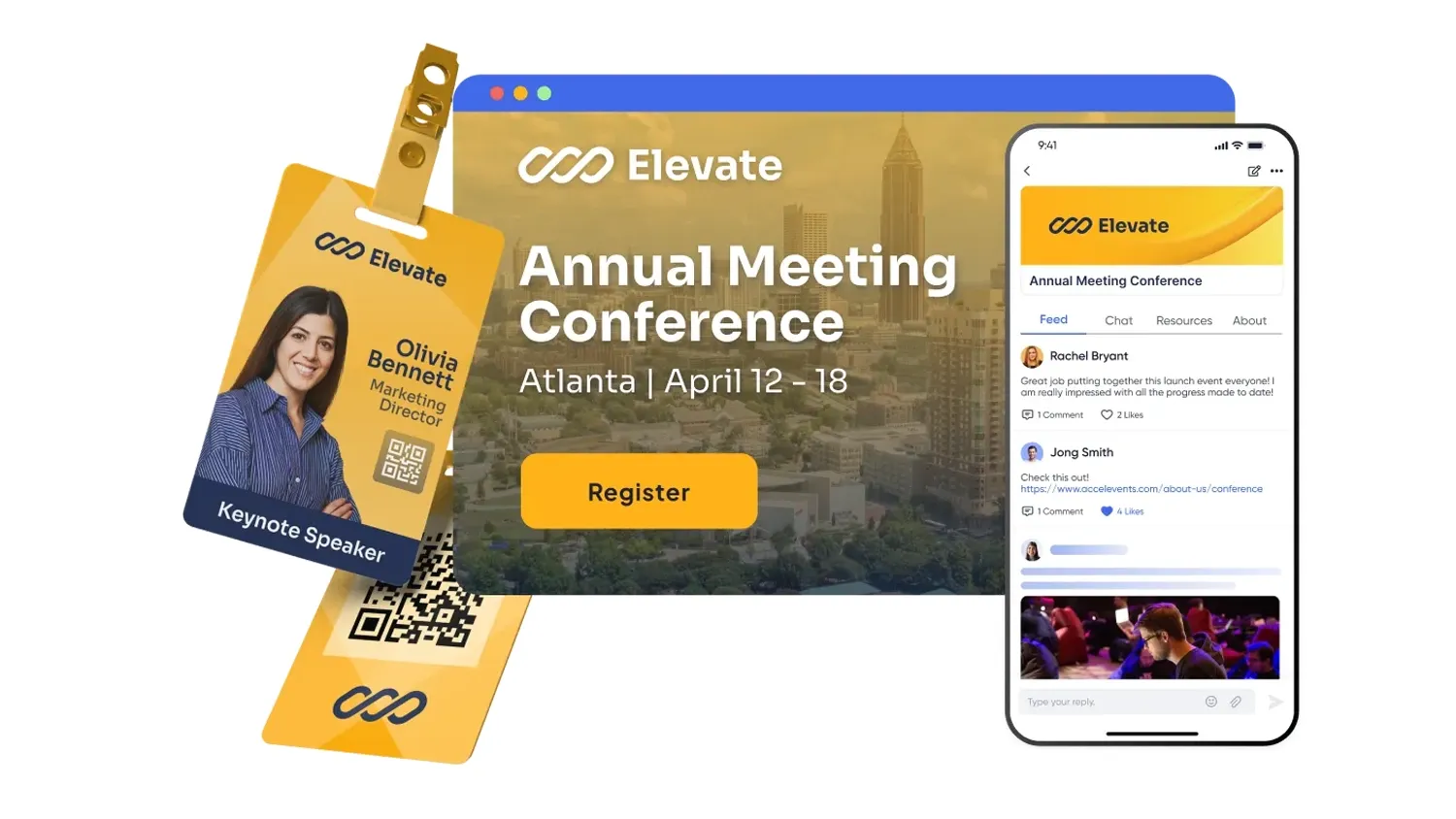Savvy planners know that a pinch of branding magic can turn a vanilla event into the talk of the town. But, stitching that brand story across both digital and real-world arenas? Now, that's a craft!
The secret ingredient for successful event branding might just be the event management platform you pick. Dive into this post to discover how selecting the right event platform can help you with your event marketing and branding efforts.
So What Exactly is Event Branding?
Event branding involves crafting a distinctive and lasting identity for an event through visual and communicative components like the theme, event logo, color palette, fonts, visual elements, messaging and taglines. The objective is to foster a unified brand perception that distinguishes the event for event attendees, sponsors, and potential collaborators.
Think of event branding as the secret sauce that gives your event its unique flavor and “vibe”. It’s your event's personality and it ensures people don't just attend, but truly feel the event.


Event Brand vs. Organization Brand: Cohesive Promotion at Events
Branding is a powerful tool in shaping audience perception. In event management, it's crucial to distinguish between an event's unique brand and the broader organization's brand.
Differentiating them is straightforward:
Event Brand: This encapsulates the spirit of the event — its theme, purpose, audience, and overall experience. It features distinct design elements, event messaging, and taglines.
Organization Brand: This represents the broader identity, reflecting the company's mission, values, and overarching message.
To harmonize these two brands and elevate the attendee experience while enhancing brand recognition among your target audience, consider the following:
Consistency: Ensure the event aligns with the organization's values. For instance, if a company champions sustainability, its event should mirror eco-friendly practices.
Visual Synergy: Integrate the organization's color scheme and logo into the event's branding, while introducing event-specific elements or motifs.
Unified Messaging: Let the event's voice be an echo of the primary brand narrative.
Integrated Promotion: Promote both the event and organizational brand cohesively across digital and physical platforms, offering consistent attendee touch points.
Feedback for Strategy: After the event, evaluate the effectiveness of blending the two brands to refine future strategies.
In conclusion, while events should flaunt their unique essence, they must also align with the overarching brand. This unified approach not only magnifies the event's impact but also strengthens brand loyalty.

The Core Benefits of Event Branding
After understanding the delicate balance between an event brand and an organization brand, it's paramount to underscore why event branding is vital.
Here are the core benefits of a well-crafted event branding strategy:
1. Reinforced Brand Identity
- Distinct Personality: A strong event brand gives your event a distinct persona, making it stand out in a saturated market.
- Authenticity: Consistent branding resonates authenticity, helping attendees trust the event and by extension, the organization.
2. Amplified Brand Visibility
- Broadened Reach: Every branded touchpoint, be it a banner, digital ad, or a social media post, amplifies your event's presence.
- Engagement Boost: Branded event content, from blogs to videos, is more likely to be shared, increasing organic visibility.
3. Enhanced Brand Recall
- Memorable Interactions: Unique branding elements, like innovative swag or a catchy tagline, leave lasting impressions, ensuring attendees remember your event.
- Repeat Attendees: Strong brand awareness translates to a higher likelihood of attendees returning for future events or engaging more with the parent brand.
A strong brand narrative creates ripple effects, solidifying both the event's and the organization's place in attendees' minds.

Deciphering Digital and Onsite Event Branding
When most hear “event branding” they picture logos plastered everywhere - on stickers, t-shirts, swag, and those nifty giveaways we love from big conferences. But really, event branding is like the soul of your event, influencing every aspect of the event experience. Let's break it down a bit:
- Digital Branding: Digital branding is particularly relevant if you are considering a digital event or a hybrid event, where your virtual event hub is central to attendee engagement. But even for onsite events, your event promotion needs to include a beautiful, professionally designed event website, along with engaging email and social media campaigns.
- Onsite Branding: From those sleek event badges that attendees wear with pride, to user-friendly, branded check-in kiosks and eye-catching signage that guides them, this is the real-life handshake, the first impression!


How Event Management Platforms Help With Successful Event Branding
Leading event management platforms can help event planners extend event branding beyond the typical marketing channels:
- Event Website: Platforms like Accelevents offer intuitive event page builders, letting you whip up a dazzling event website in no time. Opt for software that lets you play around with logo placements, colors, designs, and typography – making your event unmistakably yours.
- Event Badge: These aren't just name tags! Craft them well, and your attendees will become walking brand ambassadors. A cleverly placed logo can turn each attendee into a branding champion.
- Check-in Kiosks: Swap the plain-Jane check-in for branded kiosks that give attendees a branded hello right from the start.
- Reminders & Confirmations: Amidst a flood of emails in your recipient's inbox, ensure yours stand out and remain memorable with a splash of branding.
- Mobile Apps: Given we can't resist a peek at our phones, why not let your event's branding shine through an app? It's a subtle, yet effective nudge to keep your brand front and center.
- Virtual Hub: Infuse branding into virtual spaces to elevate the experience, making it feel less like another webinar and more like a branded extravaganza!

The Dance of Sponsorship, Event, and Organization Branding
In the intricate ballet of event orchestration, sponsorship branding emerges as another pivotal player alongside event marketing. Sponsors bring with them their own set of brand values, visuals, and voice.
While it's essential to give sponsors their spotlight, this shouldn't overshadow the event's core brand essence or the parent organization's identity. Instead, the key lies in harmoniously weaving together these branding narratives.
Here are some practical considerations you will need to address:
- Brand Real Estate: Every event has its key touch points—banners, signage, digital platforms, or printed materials. Allocate specific spaces for sponsor logos and mentions, ensuring they're visible without overwhelming the event or organizational branding.
- Consistent Design Language: While sponsors have their unique brand colors and styles, incorporating them should not lead to a jarring visual experience. Opt for a design template that allows sponsor logos to be displayed in a way that's consistent with the event's color scheme and aesthetics.
- Sponsorship Tiers: If you have multiple sponsors, consider creating sponsorship tiers. Gold, Silver, and Bronze tiers, for instance, can determine the prominence of branding placement, ensuring bigger sponsors get the visibility they've invested in, while still maintaining a cohesive look and feel.
- Digital Integration: On digital platforms like event apps or websites, ensure that sponsor logos or ads are well-integrated. This could be in the form of banner ads, pop-ups, or sponsored sessions. The design and timing should align with the overall event flow.
- Content Collaborations: Engage sponsors in co-created content, like panel discussions or workshops. This allows their brand to be showcased in a manner that adds value to the event, rather than just being a passive logo display.
- Physical Placements: At in-person events, consider how physical placements, like booths or stalls, can be designed. Sponsor booths should be integrated seamlessly into the event layout, with clear pathways leading attendees to both key event activities and sponsor areas.
- Feedback Loop: After the event, involve your sponsors in feedback sessions. Understanding their perspective can provide insights on how to better integrate branding in future events.

Maximizing Event Branding for All Event Stakeholders
Event branding is much more than just a logo on a banner; it's a comprehensive strategy that brings together the uniqueness of your event, the brand identity of your organization, and the aspirations of sponsors. The event management platform you choose is central to this, acting as the bridge connecting these elements seamlessly.
Knowing this, consider selecting an all-in-one event management platform equipped with white labeling and end-to-end branding options. This will allow you to host any type of events, be it hybrid, or digital, or onsite events, all under the umbrella of your brand identity. The result? An event experience where your organization stays front and center, unhindered by software branding, ensuring every interaction is authentically yours.
If your interested in hosting a fully branded, memorable experience, contact us! We’d be happy to discuss event branding ideas for your next event, while also providing you with a comprehensive walkthrough of our white labeling options.








